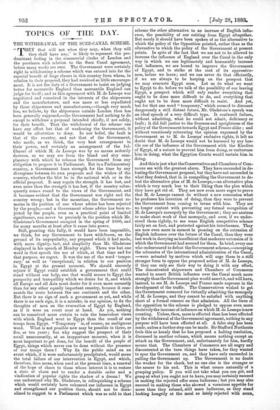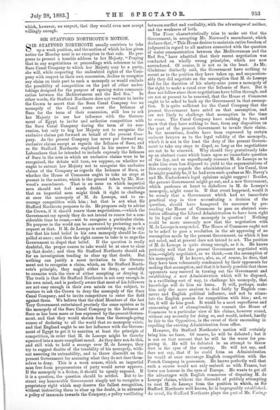TOPICS OF THE DAY.
THE WITHDRAWAL OF THE SUEZ-CANAL SCHEME.
HEY that will not when they may, when they will they shall have nay," is likely to represent the pre- dominant feeling in the commercial circles of London and the provinces with relation to the Suez Canal agreement, before many weeks are over. The Government were certainly right in withdrawing a scheme which was entered into for the especial benefit of large classes in this country from whom, in relation to their proposal, they had received so little encourage- ment. It is not the duty of a Government to insist on judging better for mercantile England than mercantile England can judge for itself; and as this agreement with M. de Lesseps was negotiated and conceived in the interests of the shipowners and the manufacturers, and was more or less repudiated by those shipowners and manufacturers,—though very much less, we believe, by the shipowners outside London than has been generally supposed,—the Government had nothing to do except to withdraw a proposal intended chiefly, if not solely, for their benefit. That the withdrawal of the scheme can have any effect but that of weakening the Government, it would be affectation to deny. In our belief, the fault is that of the country, and not that of the Government, who made, as we think, the very best arrangement in their power, and certainly an arrangement of the ful- filment of which M. de Lesseps was by no means ardently desirous, as we may see from the bland and airy com- placency with which he releases the Government from any obligation to propose it to Parliament. But in a Parliamentary country, a Government loses strength for the time by any divergence between its own proposals and the wishes of the country, whether the blot be in the national wish or in the official proposal. It may regain the strength it has lost, and even more than the strength it has lost, if the country subse- quently comes round to the views of the Government, and it becomes evident that the Government was right and the country wrong ; but in the meantime, the Government re- mains in the position of one whose advice has been rejected by the people,—and a Government whose advice has been re- jected by the people, even on a practical point of limited significance, can never be precisely in the position which Mr. Gladstone's Government occupied in the spring of 1880, and for many months at least after it came into power. Still, granting this fully, it would have been impossible, we think, for any Government to have withdrawn, on the ground of its unpopularity, any proposal which it had made, with more dignity, tact, and simplicity than Mr. Gladstone displayed in his speech of Monday night. There was but one word in that speech the use of which, at that time and for that purpose, we regret. It was the use of the word tempo- rary,' aa well as 'exceptional,' in relation to our position in Egypt at the present moment. We should sincerely rejoice if Egypt could establish a government that could stand without our help, one that would secure to Egypt the prosperity and tranquillity which we desire for it, and which all Europe and all Asia must desire for it even more earnestly than for any other equally important country, because it com- mands the route between the one continent and the other. But there is no sign of such a government as yet, and while there is no such sign, it is a mistake, in our opinion, to fix the thoughts of men on the evacuation of Egypt by England, as if it were an event near at hand. As yet, nothing can be conceived more certain to ruin the benevolent views with which England went to Egypt than the recall of our troops from Egypt. "Temporary "is, of course, an ambiguous word. What is not possible now may be possible in three, or five, or ten years ; but why suggest the prospect of their recall unnecessarily, at an inopportune moment, when it is most important to get done, for the benefit of the people of Egypt, things which never can be done without the presence of our troops there Why fix the public mind on an event which, if it were unfortunately precipitated, would mean the total failure of our intervention in Egypt, and which, therefore, does mean, when used at the present time, a renewal of the hope of chaos to those whose interest it is to restore a state of chaos and to render a durable order and a vindication of popular rights the shadow of a dream ? We can understand why Mr. Gladstone, in relinquishing a scheme which would certainly have enhanced our influence in Egypt and strengthened our position there, should not be disin- clined to suggest to a Parliament which was so cold to that scheme the other alternative to an increase of English influ- ence, the possibility of our retiring from Egypt altogether.. But surely it should have been spoken of as the alternative to- which the policy of the Opposition pointed, rather than as the alternative to which the policy of the Government at present points. In spite of the fact that we are not to be allowed to increase the influence of England over the Canal in the only way in which we can legitimately and honourably increase that influence, we are bound to improve the Government of Egypt, and to strike at the root of its oppressive- ness, before we leave ; and we can never do that efficiently, if we are always to be harping on the prospect that we may evacuate Egypt soon. Let us do what we went to Egypt to do, before we talk of the possibility of our leaving- Egypt, a prospect which will only render everything that ought to be done more difficult to do, and everything that ought not to be done more difficult to resist. And yet, but for that one word "temporary," which seemed to discount dangerously a still distant future, Mr. Gladstone's speech was. an ideal speech of a very difficult type. It confessed failure, without admitting, what he could not admit, deficiency or fault ; it did full justice to the firmness and uprightness of the policy of the Government towards Egypt and France alike ; and without vexatiously reiterating the opinion expressed by the Government as to M. de Lesseps' exclusive rights, it left no. doubt that M. de Lesseps would not be harassed by any hos- tile use of the influence of the Government with the Khedive of Egypt, of a nature to prevent him from doing, or embarrass him in doing, what the Egyptian Courts would sustain him in. doing.
And this is just what the Conservatives and Chambers of Com- merce see with the greatest alarm. They have succeeded in de- feating the Government proposal, but they have not succeeded in what they desired, that is, in compelling the Government to de- feat the alternative plan of M. de Lesseps,—an alternative plan which is very much less to their liking than the plan which they have got rid of. They are now even more eager to prove that M. de Lesseps cannot do without a new concession what he professes his intention of doing, than they were to prevent the Government from coming to terms with him. They are no longer content with preventing any formal recognition of M. de Lesseps's monopoly by the Government ; they are anxious to make short work of that monopoly, and even, if we under- stand them rightly, to see some English competitive scheme fairly set on foot, and protected against his interference. They are now even more in earnest in pressing on the extension of English influence over the future of the Canal, than they were last week in decrying as insufficient that moderate extension of it which the Government had secured for them. In brief, every one who endeavoured to defeat the Government scheme,—excepting the advocates of the international administration of the Canal, —were actuated by motives which will urge them in a still stronger form to oppose the proposed action of M. de Lesseps, if they can only see their way to doing it with any effect. The discontented shipowners and Chambers of Commerce wanted to assert British influence over the Canal much more strongly than the Government plan would assert it, and will have, instead, to see M. de Lesseps and France made supreme in the development of the traffic. The Conservatives wished to get the Government censured for virtually admitting the monopoly of M. de Lesseps, and they cannot be satisfied with anything short of a formal censure on that admission. All the force of the opposition to the scheme is pledged to oppose even more decisively the increase of influence on which M. de Lesseps is now counting. Unless, then, more is effected than has been effected by the withdrawal of the Government agreement, nothing to any purpose will have been effected at all. A false step has been made, unless a further step can be made. Sir Stafford Northcote feels this so keenly that he has proposed a halting resolution, discussed in another column, which means nothing except an attack on the Government, and, unfortunately for him, hardly means that. The Chambers of Commerce are all angry and discontented at the turn things have taken, for they wanted to spur the Government on, and they have only succeeded in pulling the Government up. The Government is no doubt the weaker for the check, but no one else is the stronger or the nearer to his end. This is what comes naturally of a grasping policy. If you will not take what you can get, and grasp at what you ought not to have, you may certainly succeed in making the rejected offer seem ludicrous ; but you may also succeed in making those who showed a voracious appetite for more than they refused, still more ludicrous, as they stand looking hungrily at the meal so lately rejected with scorn,
which, however, we suspect, that they would even now accept willingly enough.



































 Previous page
Previous page